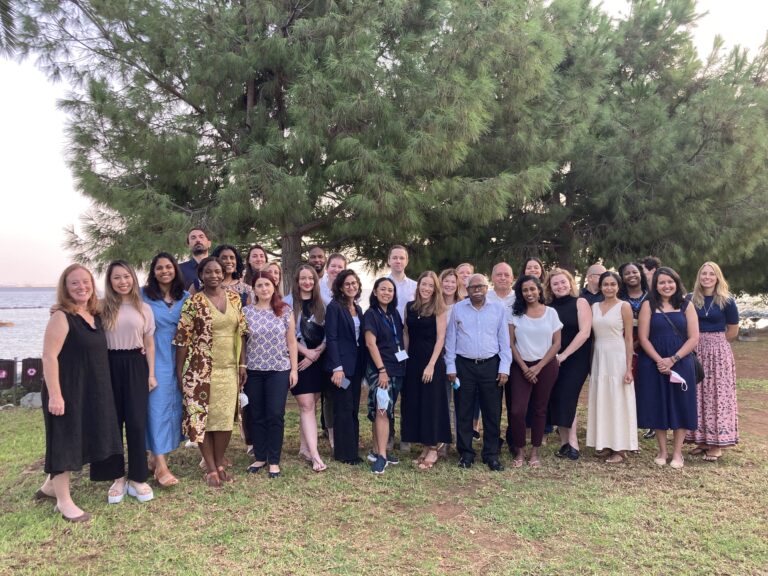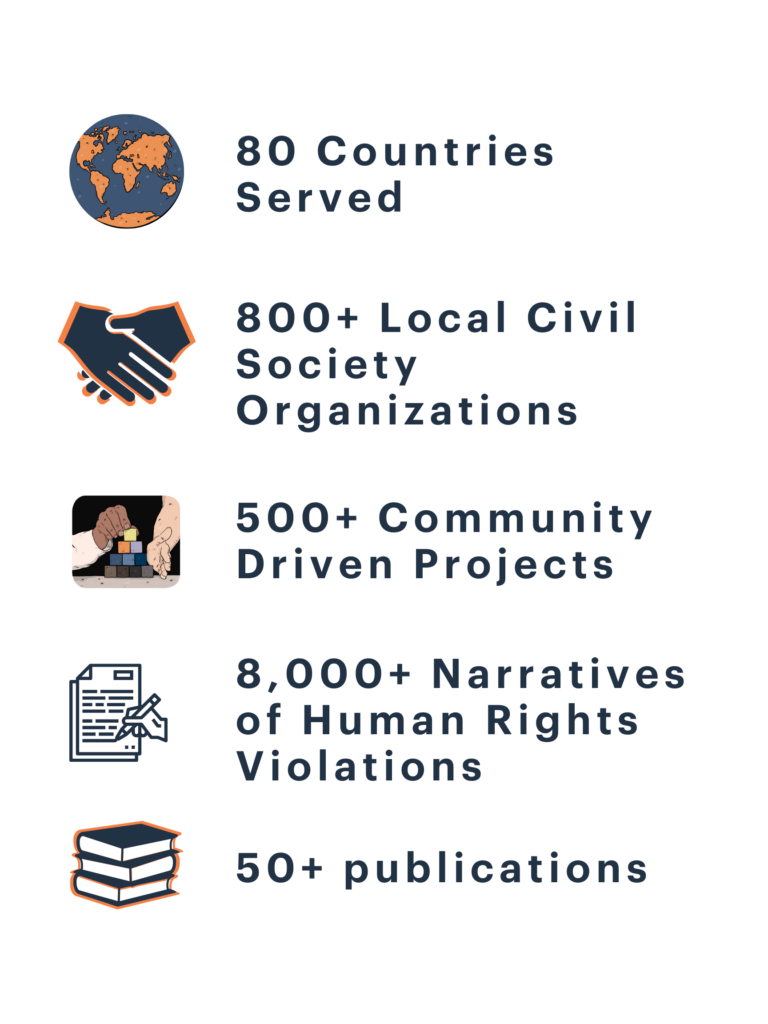The Global Initiative for Justice Truth and Reconciliation
GIJTR is a pioneering civil society-led mechanism that works across multiple regions, employing a range of disciplines to address existing and emerging issues within the field of transitional justice.

For Spanish
Founded in 2014 by the International Coalition of Sites of Conscience (ICSC), GIJTR offers holistic, integrative and multidisciplinary approaches to issues of truth, justice and reconciliation. As a consortium comprising of nine international[g1] organizations, GIJTR works with local populations, civil society organizations (CSOs) and governments to develop a transitional justice approach that is victim-centered, collaborative and supports dignity, respect, inclusion and transparency in societies emerging from conflict or periods of authoritarian rule.
By drawing on various disciplines, including memorialization, psycho-social support, documentation, forensics and rule of law, GIJTR consortium partners have worked collaboratively to bring together their organizational expertise and resources to cultivate and implement victim-centered and community-led programming in a participatory, inclusive and holistic manner. GIJTR utilizes six primary and interlinked programmatic approaches to support and sustain civil society actors seeking to promote positive change in conflict and post-conflict settings. At its core, all GIJTR work is:
- Victim Centered and Responsive
- Context Informed
- Innovative and Non-Prescriptive
- Locally Driven and Action Based
- Holistic, Gender Transformative and Trauma Informed
- Influential and Non-Hegemonic
In centering these approaches through its programming, GIJTR has transformed the field of transitional justice, demonstrating the impact of what can be achieved when organizations work in a coordinated manner and go beyond thematic silos and geographical areas of focus. The Consortium’s multidisciplinary approach has also meant greater opportunities for co-creation and ownership amongst all organizations involved (local and consortium partners) and has encouraged the growth of a learning community engaged in reflective practice. Since inception, GIJTR has continued to challenge the modus operandi of the transitional justice field, both in questioning accepted practices and knowledge systems, while also demonstrating alternative models for community-driven processes.
The GIJTR’s proven interdisciplinary transitional justice method, bridging judicial and non-judicial processes, promotes just and sustainable peace in countries in transition by harnessing each partner’s expertise and engaging local CSOs, victims, and governments in a participatory manner. Furthermore, by grounding the solutions to peace and justice within local communities and exploring cutting-edge issues, GIJTR seeks to address the complex questions of root causes and creates local ownership and sustainability of truth, justice, and reconciliation processes.

Statistics
Since its founding, GIJTR has partnered with over 750 CSOs, conducting approximately 700 capacity building workshops and 58 learning exchanges that reached over 42,000 participants from 78 countries. The consortium has over 50 publications, including toolkits and policy briefs, in addition to social media campaigns, podcasts, newsletters and other knowledge-sharing activities, many displayed throughout this exhibition. Through GIJTR’s small-grant project model, 493 community-driven projects have received funding and technical support to address emerging and nascent issues of truth and justice with a bottom-up approach. Over 8,000 narratives of human rights violations have been collected by GIJTR-trained and supported documenters in post-conflict contexts and contexts of ongoing violations. Through GIJTR’s long-term, multi-phased approach grounded in mutual trust and collaboration, GIJTR has facilitated the creation of ten new networks have been formed comprising 145 civil society organizations in 23 countries.
In the last decade since its founding, GIJTR has worked to promote new approaches to engaging with human rights violations and in so doing has worked to widen the boundaries of the transitional justice field. These impacts can be seen across civil society, communities of victims and survivors and the transitional justice field.
GIJTR’s Work with CSOs
GIJTR’s revolutionary approach to centering the capacities and expertise of local civil society and victim-led organizations, has cultivated wide-ranging impacts on the lives of victims and survivors and transitional justice processes more broadly. The impact of this approach is evident in the growth and development of a diverse multitude of local civil society organizations (CSOs) who are deeply engaged in critical spheres of transitional justice and the building and sustaining of relationships and networks across regions. In contexts like Sri Lanka, Guinea and South Sudan, GIJTR has supported CSOs in their creation of networks and coalitions that work collectively to advocate on the needs of victims. These networks are able to reach broader society and aid in developing a sense of solidarity and empathy, which remains key to ensuring non-recurrence of violations.
GIJTR’s work with Survivors and Conflict Affected Communities
In building deep relationships with local civil society partners, who in turn have close connections to or indeed are victims or affected communities, GIJTR is able to effectively works with victims and survivors at every stage of programming—from listening to their needs and co-designing the activities that will address those needs to implementing and amplifying activity outputs. In Colombia, where it has worked since 2017, GIJTR supports a range of truth-telling mechanisms, which offer survivors intimate opportunities to share their individual stories in ways that foster personal and communal healing. GIJTR’s work in Bangladesh has engaged 250 Rohingya refugees in dialogue circles to share their life stories and produce memorialization projects for wide dissemination. In the Gambia, listening circles and women-only safe spaces were supported to provide alternative truth-telling platforms for women to access in light of fear of stigma for speaking at the Truth, Reconciliation and Reparations Commission. GIJTR impact shows that putting the victim or survivor at the center of the process promotes their recovery, reinforces their agency and self-determination, and reduces the risk of further harm.
GIJTR within the Transitional Justice Field
GIJTR has transformed the field of transitional justice by catalyzing and amplifying expertise in the Global South by supporting diverse practitioners and scholars who can inform the wider field based on their own learned and lived experiences. In doing so, GIJTR seeks to shift the traditional power dynamics around who creates knowledge on behalf of whom, correcting a major weakness and significant historic oversight in the transitional justice field, which for decades has been criticized for promoting exclusively Western approaches.
There is no one-size-fits-all model of transitional justice, a central tenet that fuels GIJTR’s impact. To further this, GIJTR has made significant contributions to the mainstreaming mental health and psychosocial services into all aspects of transitional justice and legitimizing the use of memorialization and art-based techniques within the field as a concrete way to help survivors heal from trauma and spark more concrete actions that advance justice and accountability. GIJTR has also pioneered an explicit connection between transitional justice and atrocity prevention, seeing its work as directly advancing atrocity prevention especially in political environments that have no formal mechanisms or an engagement with accountability. Equally, GIJTR has broaden the scope of human rights violation documentation efforts by training local documenters to be at the forefront of capturing the testimonies of their own communities. GIJTR-supported documenters come from within the community and therefore are far more trusted, allowing the collection of more accurate, detailed testimonies which are stored for future accountability purposes.
